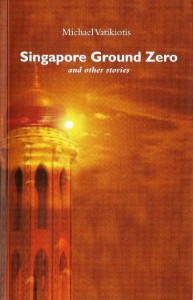 Singapore Ground Zero by Michael Vatikiotis is a collection of six short stories, which, as the title suggests, deals with the Muslim world of Southeast Asia in the post-September 11 terrorist attacks. The author can be considered an expert on matters relating to Asia, in general, and Southeast Asia, in particular, having worked as a journalist in the region for over twenty years. He has written both non-fiction and fiction books, with a focus on the Asian region. His fiction includes Debatable Land (Talisman, 2001), his first collection of short stories, and The Spice Garden (Equinox, 2003), a novel set in Indonesia and based on true accounts of religious violence. Singapore Ground Zero and Other Stories is his second collection of short stories and was published in 2007 by Singapore-based Talisman.
Singapore Ground Zero by Michael Vatikiotis is a collection of six short stories, which, as the title suggests, deals with the Muslim world of Southeast Asia in the post-September 11 terrorist attacks. The author can be considered an expert on matters relating to Asia, in general, and Southeast Asia, in particular, having worked as a journalist in the region for over twenty years. He has written both non-fiction and fiction books, with a focus on the Asian region. His fiction includes Debatable Land (Talisman, 2001), his first collection of short stories, and The Spice Garden (Equinox, 2003), a novel set in Indonesia and based on true accounts of religious violence. Singapore Ground Zero and Other Stories is his second collection of short stories and was published in 2007 by Singapore-based Talisman.
In Singapore Ground Zero, the story that opens the collection, the reader finds out about the dangers of believing everything one reads in books, especially if the books are strongly against Islam. Stanley Tan, your usual government employee who fully trusts the powers to be, becomes obsessed with the threat Islam poses to world peace and looses “himself in the world of terror.” Unfortunately, Stanley cannot differentiate between the normal life of everyday Muslims living in Singapore and “the grainy mug shots of bearded men wearing turbans and brandishing machine guns.” This flaw of judgment will eventually bring about his tragic demise.
 Catching Communists deals with the disillusionment of an insignificant government employee whose job is to hunt down communists and make sure all dissidents in Indonesia are silenced. Seen as a national threat, communists “come alive at night and fill the dark void like spirits, plotting the downfall of our nation.” It is a story of extremes that force the characters to take sides. However, when the communists are no longer a threat, the former ‘hunters’ become underground Islamist militants, fighting against “the Great Satan in the shape of the United States.”
Catching Communists deals with the disillusionment of an insignificant government employee whose job is to hunt down communists and make sure all dissidents in Indonesia are silenced. Seen as a national threat, communists “come alive at night and fill the dark void like spirits, plotting the downfall of our nation.” It is a story of extremes that force the characters to take sides. However, when the communists are no longer a threat, the former ‘hunters’ become underground Islamist militants, fighting against “the Great Satan in the shape of the United States.”
In Scar Face at Ground Zero, we find out about a young Indonesian’s post 7/11 trip to the United Stated. But, Dimiati Subianto’s first trip to America is not what he had expected it to be: “Denny came of age believing that America stood for levels of perfection and comfort that in Indonesia he could only dream about.” Instead, he has to deal with the Americans’ fears of Muslims and witnesses the injustice Muslims face in the USA.
The Pluralist is a short story that takes the reader to Malaysia and the struggle between moderate and radical Muslims: “It’s not the business of state officials to dictate how good a Muslim I am or am not.” For voicing such opinions, Daud Sileiman becomes a hero in the eyes of the Western media but, after the Malaysian government arrests him and throws him in jail, the Western world seems to forget about him. Unfortunately, this will make Daud join ranks with Al Qaeda.
A Rebel to Remember is set both in Malaysia and Thailand and deals with a foreign journalist’s dangerous journey to Patani, in the south of Thailand, a region that “is the meeting point of two dramatically different peoples, the Buddhist Thai and Muslim Malay.” Once he crosses the border into Thailand, his driver is assassinated, the village headman who gives him shelter is gunned down by the Thai soldiers, the women of the village brutally murder two soldiers, and his guide takes up arms to continue the insurgency.
Television, the final short story in the collection, presents through the eyes of a 12 years old beggar the crackdown of a demonstration by the Indonesian soldiers on the streets of Jakarta.
Singapore Ground Zero is a book in which Michael Vatikiotis describes, without taking sides, the good, the bad and the ugly of Islam. What make this book a valuable and accurate description of the Muslim world in Southeast Asia is that the stories are seen through the point of view of both sides, with the author masterfully avoiding the necessity to take sides.
Photo source
